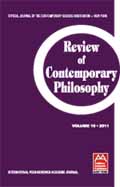THOMAS S. KUHN’S INSTITUTIONAL THEORY OF STABILITY AND CHANGE
THOMAS S. KUHN’S INSTITUTIONAL THEORY OF STABILITY AND CHANGE
Author(s): Rick VogelSubject(s): Philosophy
Published by: Addleton Academic Publishers
Keywords: scientific community; Thomas S. Kuhn; institutionalism; social constructivism; phenomenology
Summary/Abstract: With his philosophy of science, Thomas S. Kuhn has provided a theory of stability and change that complies with sociological institutionalism in many respects. Emanating from social phenomenology, institutional theory has become one of the major theories in contemporary sociology and beyond. My argument is that Kuhn’s communitarian approach has incorporated and anticipated much institutional thinking on the occurrence, constitution and change of socially constructed reality. I outline points of convergence between the Kuhnian philosophy and institutional theory, and discuss how both would benefit from a mutual engagement. As a general result, institutionalism provides sociological arguments when it comes to understand the taken-for-grantedness of the institutional order scientists work in during “normal” periods. Conversely, institutionalism benefits from Kuhn’s approach with regard to institutional change in “revolutionary” episodes.
Journal: Review of Contemporary Philosophy
- Issue Year: 2011
- Issue No: 10
- Page Range: 80-100
- Page Count: 21
- Language: English
- Content File-PDF

